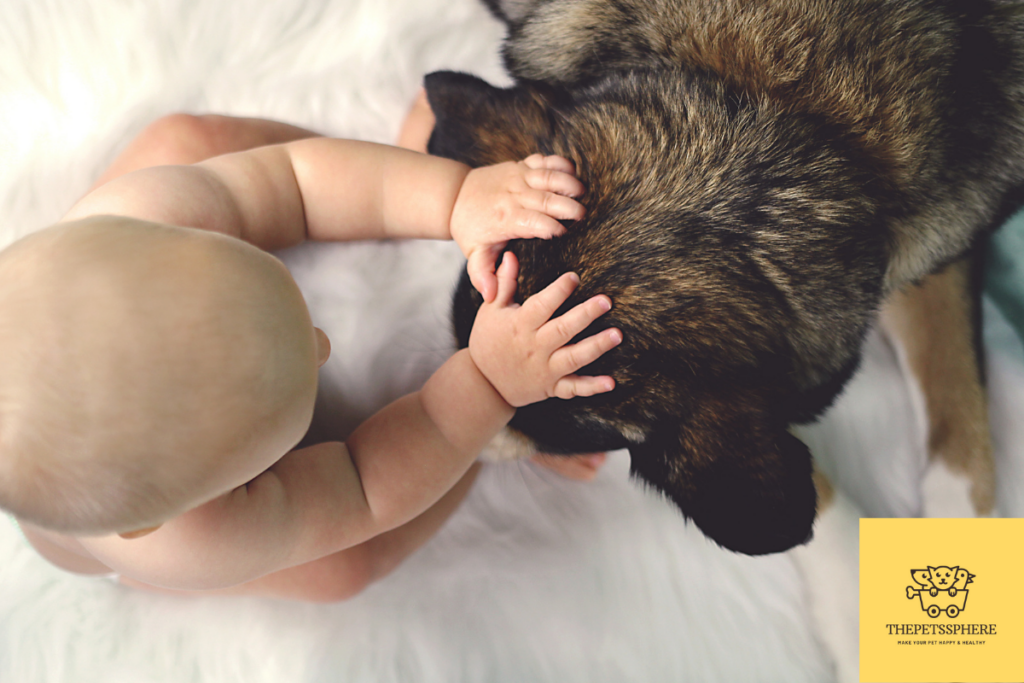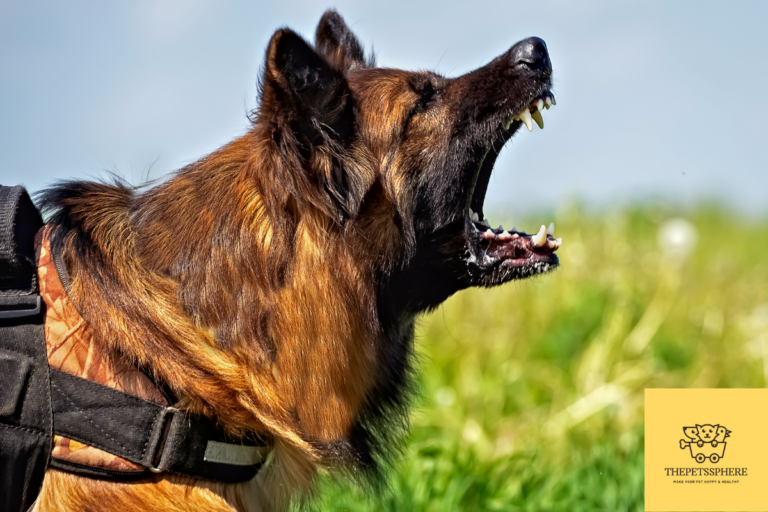Many people are under the impression that German Shepherds are aggressive.
It is important to understand that not all German Shepherds are aggressive, and it depends on their genetics and upbringing.
Have you ever been around a german shepherd? Did they seem friendly or did they bark at you? Luckily, this article will answer these questions for you!
Are German Shepherds Aggressive to Humans?
German shepherds are known for being loyal, intelligent and protective dogs. It’s a common misconception that they’re aggressive towards humans because of their imposing size and scary growls; however, this is not the case. The German shepherd may be an intimidating dog to see on the street alone but he or she will never attack without provocation. In fact, german shepherds are very affectionate dogs who love to cuddle with their owners!
Many German Shepherds have a high guard drive which means they will protect what they perceive as theirs, including their family members or property by driving off potential threats with barking, growling and teeth baring. This trait is sometimes misinterpreted as aggression by those unfamiliar with the breed’s history or training.
However, as with any breed there is a chance that your German shepherd will be aggressive towards humans if you don’t give them enough attention or socialization when they’re young. But it’s easy to avoid this problem by following these simple guidelines:
-Introduce new people slowly
-Keep in mind that not all dogs like kids so keep an eye on how your dog reacts around children before letting them alone together
-Socialize your dog at a young age so he feels comfortable being around other animals and people.

Are German Shepherds Aggressive towards Babies?
Many people are concerned when they hear that a german shepherd is not aggressive to humans and are even more paranoid about bringing their baby home from the hospital with one! As long as you socialize your dog early on, it can grow up being just as friendly with children of all ages as it is with adults.
There are many misconceptions about german shepherds, and the fact that they can be aggressive to humans if not properly trained or socialized only perpetuates these myths!
In reality, this breed has a lot of qualities which make them good pets for families such as their intelligence, loyalty and protective nature.
6 Reasons Behind Aggressive Behavior of German Shepherds
Aggressive behavior in german shepherds is not uncommon. Just like any other dog, there are many reasons why your furry friend may be acting aggressive including a lack of socialization, fear or anxiety, dominance issues and more. This blog post will discuss 10 reasons for aggression in german shepherds with tips on how to help manage this type of behavior.
1) Lack of socialization
German Shepards are highly intelligent animals that need regular exercise and mental stimulation to keep them happy (just like humans). If they don’t get enough exercise and attention they can become bored which often leads to destructive behaviors such as chewing furniture or barking excessively at night when everyone’s asleep. A good way to combat this would be to start a new exercise routine or try a dog walking service so that the german shepherd has another playmate to interact with and get out some of their energy.
2) Fearful Temperament
Some dogs have a natural fearfulness that can make them feel threatened by anything unfamiliar such as other dogs or loud noises so they lash out defensively. In order to help alleviate this fearfulness, the owner should try introducing them slowly and gradually increase contact or exposure. This can be done by starting with an empty room where they are in a comfortable environment while being introduced to new people or animals that are farther away from your german shepherd.
If you are already dealing with aggression towards humans, it is important to consult with a veterinary behaviorist or certified animal behavior specialist .
3) Territorial Behavior
Dogs don’t like when things come into their territory without permission. This is especially true for German Shepherds, who are known to be territorial animals. Owners may need to establish boundaries and set expectations such as having your german shepherd sit next to you when people are in the house or not allowing them on top of furniture if you are home alone .
If there are multiple dogs living in the household, it is very important to establish a place for each dog in order to avoid territorial behavior.
4) Mental Illness
Some German Shepherds suffer from mental illness such as anxiety or PTSD, which could be causing the aggression issues.
5)Unwanted Behavior
Sometimes dogs exhibit unwanted behaviors because they have been trained by humans to do so through punishment. They are not “bad dogs” and these are behaviors which could be corrected if the owner is persistent, consistent and patient .
If a dog is aggressive because they are fearful or territorial, it can lead to further aggression when their human communicates with them in an angry manner. If someone is upset or yelling at your pet, it is best to not confront them or get into a physical altercation.
6)Lack of Training
German Shepherds are popular guard dogs but if they are not trained, then you need to curb their aggressive tendencies. This is done by teaching them that being a good guard dog requires patience and attentiveness as well as proper training. Guard dogs should be able to tell the difference between intruder versus family member or friend and don’t attack unless necessary. If your German Shepherd has been properly trained, it will know how to bark at intruders without attacking them, which makes for a much better situation all around.
How to make German Shepherd Less Aggressive?
The german shepherd is known for being a powerful, tenacious and intelligent breed of dog. However, with these qualities it can also be vulnerable to developing aggression or fear-related behaviors. Now we will be looking at six methods on how to make german shepherds less aggressive.
1. Train with positive reinforcement
Use treats, toys or pats on their back when they do something good. This will show them that being nice is better than being mean.
2. Reward for Calm Behavior
reward the dog with praise, food or other things it likes after they stop barking at strangers or other pets in front of them. This will teach them that there are rewards for behaving well and punishments for misbehaving.
3. Provide attention during times of stress- if the dog is feeling stressed, give it attention by petting its head or talking softly to reassure it before giving it a warning to stop.
4) Establish rules
Your pets should know which are the boundaries of your home and what they are allowed to do. This will teach them that there are consequences for breaking those rules
– German Shepherds are highly territorial animals so establish a place for each dog in order to avoid territory issues.
– Set expectations such as not letting your german shepherd on furniture if you’re at home alone.
– If your german shepherd has been properly trained, it will know how to bark at intruders without attacking them which makes for a much better situation all around.
– German Shepherds are popular guard dogs but if they are not trained, then you need to curb their aggressive tendencies with patience and attentiveness as well.
If the dog continues to misbehave, then they are not able to get attention and are left feeling lonely or ignored which can cause more aggression in them.
5) Walk with your GSD Regularly
Walk with your GSD regularly to help reduce their excess energy. This will also help remove pent up emotions like anxiety or frustration that are sometimes the cause of aggression.
Regular exercise helps reduce excess energy which can lead to aggression.
6) Teach them Commands
Teach them commands such as “sit” and “stay”. If they are able to follow these simple instructions, then it can give you time for yourself without having to worry about them running away or harming someone else.These skills help them be obedient in everyday situations while also giving them the ability to control themselves when they feel threatened or agitated
When your dog is in a playful mood, then it’s best to not interact with him as this can trigger his aggressive nature.
Try to understand what are the triggers for your dog’s aggression
If you are struggling with handling your german shepherd’s aggressive tendencies, it is important that you consult with an animal behaviorist or a certified animal behavior specialist.
How Animal Behaviorists Treat Aggression in German Shepherds?
Aggression in german shepherds is not uncommon and it can be difficult to treat. But animal behaviorists and vets have a few different ways they often use to help with this problem. One of the first things an animal behaviorist or vet will do is find out why the aggression started, whether it’s due to fear, pain, food guarding or something else. Aggression treatments vary depending on what caused the aggression but may include medication for anxiety or calming exercises like deep pressure therapy for dogs who are prone to attacking under stress. Animal behaviorists and veterinarians also recommend adopting a dog from an organization that specializes in aggressive breeds as well as making sure you are socializing your pet regularly so they don’t become too overprotective of their territory.
Here are 3 ways on how animal behaviorists and vets treat aggression in german shepherds:
1) Behavior modification
A vet will try to modify the dog’s behavior by teaching them what is appropriate social interaction with humans and other animals through training techniques such as clicker training or using positive reinforcement.
2) Omega3 fatty Acid Supplements
Some vets will recommend omega 3 fatty acid supplements to help improve the temperament of a german shepherd but this may not be an option for every dog.
3) Deep Pressure Therapy for Calming GSD
Some animal behaviorists are now using a technique called deep pressure therapy to help calm a dog. This helps create a sense of security for the pet and can be used as part of training exercises like desensitization or counter-conditioning.
Final Thoughts
Fearful, aggressive German Shepherds are not uncommon. These dogs have been bred for a very specific purpose – protection and guarding. But once you learn your dog’s triggers, such as feeling threatened or being left alone too long, you can help them move forward with their training regimen to ensure success in becoming less volatile. Safety is the priority both for yourself and your GSD family member! Don’t give up on this special breed of canine friend because they need patience and persistence from their human counterparts to be successful story endings like so many before them. Your tone should match that which was established throughout the conclusion paragraphs if it does not change mid-paragraph due to new information given after reading all the blog post content material.

